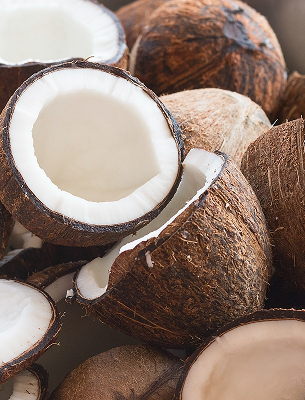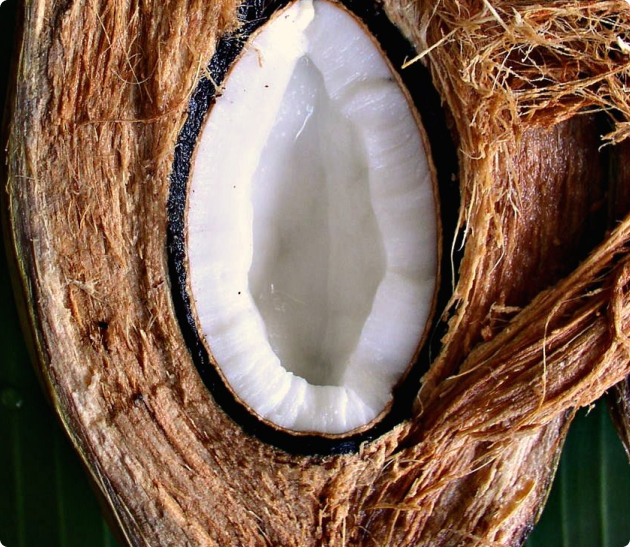 MCT Oil - NON-GMO
MCT Oil - NON-GMO
MCT oil is a type of dietary fat that provides a quick source of energy for the body. It has many health benefits, including being an aid in weight management, boost athletic performance, and can potentially benefit brain function.
MCT oil is quickly absorbed by the liver and rapidly converted into ketones, a clean fuel for the brain and body. Ketones enhance mental clarity, support steady energy, reduce reliance on glucose, and help maintain balanced metabolism.
Promotes weight management: MCT oil is easily digested and metabolized, providing a quick source of energy. It can help increase feelings of fullness and may promote a slightly higher metabolic rate, which can aid in weight management.
Boosts energy levels: MCTs are rapidly absorbed and transported directly to the liver, where they are converted into ketones, which can be used as an alternative energy source for the body and brain. This can provide a quick energy boost and reduce fatigue.
Supports cognitive function: Ketones produced from MCT oil can serve as an alternative fuel source for the brain, potentially improving cognitive function, focus, and mental clarity. There are also many studies being performed on MCT oil having a positive impact on Alzheimer's disease.
Supports gut health: MCTs are less likely to be stored as fat and are easily digested, making them easier for the body to tolerate compared to other fats. They may also have antimicrobial and antifungal properties that can support a healthy gut environment.
Improves nutrient absorption: MCT oil can help improve the absorption of fat-soluble vitamins, such as vitamins A, D, E, and K, as well as certain antioxidants.
MCT Oil effects on the 12 Hallmarks of Aging:
Telomere Attrition:
By reducing inflammation and reducing oxidative stress generated in mitochondrial metabolism, MCT’s can help preserve telomeres [2][3].
Epigenetic Alterations:
While MCT’s do not have a direct impact on epigenetics, their effects on inflammation, gut microbiota, and metabolism could cause epigenetic benefits over time.
Cellular Senescence:
MCT oil can be more efficiently turned into energy (through ketosis) which could help reduce oxidative stress and help cells stay healthy and senesce properly.
Inflammation:
MCT oil has been shown to control inflammatory responses through modulation of mitochondrial energy metabolism [2].
Dysregulated Autophagy:
MCT’s have been shown to activate the AMPK signaling pathway [3]. AMPK activation positively regulates signaling pathways that replenish cellular ATP supplies, including fatty acid oxidation and autophagy [5].
Genomic instability:
By improving mitochondrial energy production and reducing inflammation, MCT’s can create a more stable environment for DNA.
Mitochondrial Dysfunction:
MCT’s are metabolized as ketones in the body in a process know as ketosis. These ketones are used to produce ATP in mitochondria more efficiently than normal metabolism fuel. This puts less stress on the mitochondria and protects their health.
Loss of Proteostasis:
Enhanced autophagy through MCT oil consumption helps maintain proteostasis by clearing damaged proteins and organelles, thus supporting cellular health [5].
Deregulated Nutrient Sensing:
MCT oil is rapidly metabolized into ketones, which can improve insulin sensitivity and promote weight loss [1]. This can aid in managing metabolic disorders like obesity and type 2 diabetes [4].
Intercelluar Communication:
MCTs can affect cellular communication by altering signaling pathways related to metabolism, such as the TGF-β and AMPK pathways. These pathways play critical roles in cellular growth, energy balance, and stress responses. [3]
Microbiome Dysbiosis:
“Dietary MCT, taken alone or with other supplements (such as prebiotics, probiotics, organic acids, etc.) could be used as anti-obesity interventions, in regards to their capacity to prevent intestinal permeability/endotoxemia by remodeling gut microbiota” [6].
Sources (General)
Promotes weight management:
-
A study published in the American Journal of Clinical Nutrition found that consumption of MCTs resulted in greater feelings of fullness and decreased food intake compared to long-chain triglycerides (LCTs) (Rolls et al., 1988).
- A review published in the The American Journal of Clinical Nutrition found that MCT oil led to a greater rate of weight and fat loss than olive oil. (St. Onge, et.al, 2008).
Boosts energy levels:
Supports cognitive function:
Supports gut health:
Improves nutrient absorption:
Sources (12 Hallmarks):
[1] The Ketogenic Effect of Medium-Chain Triacylglycerides
https://www.ncbi.nlm.nih.gov/pmc/articles/PMC8650700/
[2]Medium Chain Triglyceride (MCT) Oil Affects the Immunophenotype via Reprogramming of Mitochondrial Respiration in Murine Macrophages
https://www.ncbi.nlm.nih.gov/pmc/articles/PMC6915711/
[3] Medium Chain Triglycerides enhances exercise endurance through the increased mitochondrial biogenesis and metabolism
https://www.ncbi.nlm.nih.gov/pmc/articles/PMC5805166/
[4] Efficacy of Ketogenic Diets on Type 2 Diabetes: a Systematic Review
https://www.ncbi.nlm.nih.gov/pmc/articles/PMC8397683/
[5] AMPK Signaling
https://www.cellsignal.com/pathways/ampk-signaling-pathway
[6] Gut Microbiota and Metabolic Health: The Potential Beneficial Effects of a Medium Chain Triglyceride Diet in Obese Individuals
https://www.ncbi.nlm.nih.gov/pmc/articles/PMC4882694/
[7] The therapeutic implications of ketone bodies: the effects of ketone bodies in pathological conditions: ketosis, ketogenic diet, redox states, insulin resistance, and mitochondrial metabolism (accessed through UCSD)
https://www.sciencedirect.com/science/article/pii/S0952327803002217#aep-abstract-id3
